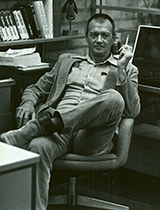Listen
Before he was diagnosed with Alzheimer's disease, Wayne Collins lived the life of a person who wanted a lot out of his time on earth.
 Wayne Collins is pictured in 1980.
Wayne Collins is pictured in 1980. He ran away from home when was 14. Rode freight trains through the southwest; hitchhiked across the border into Mexico to work on a cattle ranch. He enlisted in the military as soon as he was old enough and fought in the South Pacific during World War II. And that was only the beginning. Collins worked as a radio and TV newscaster in the 50s and 60s, then went on to run the University of Arizona’s Environmental Research Lab, where he met his future wife, Peggy.
He’s 88 now and got his Alzheimer's diagnosis two years ago, joining an estimated 120,000 Arizonans living with the condition. By 2025, that number is expected to grow to 200,000 – a nearly 70 percent increase in the next ten years. Across the U.S., only Alaska will see a steeper increase in the prevalence of the disease.
It will take a heavy toll on the state’s economy and medical system, and of course on its victims – but it does not stop there.
"Alzheimer’s does not just affect an individual," said Lee Ryan, a neuropsychologist at the UA. "It affects a whole network of people. It has devastating consequences for families. Caregivers, it takes an enormous toll on them."
Ryan studies memory and the brain and is one in a small army of experts at the university working to identify the causes of Alzheimer’s and how to prevent it.
While understanding of the disease has grown by leaps and bounds, Ryan said, research on how to treat the disorder once it has taken hold has not gone well.
"By the time the diagnosis is made, there is so much damage in the brain that it’s highly unlikely that we’re going to find, at least in our lifetime a way to reverse [it]," she said. "We want to back things up as early as possible and find ways to stop it from happening all together or at least slow the progression down."
Alzheimer's could 'overwhelm us'
Research shows that a healthy lifestyle may reduce the risk of the disease. Ryan stressed the need to stay physical, maintain a healthy weight and be social.
"And the other thing we talk about a lot is being a life-long learner," Ryan said. "Someone who is continually challenging that brain to do new things and learn new things."
But there is no guarantee that doing so will prevent the disease entirely.
Before he was diagnosed, Wayne Collins would spend hours trekking through the desert each day. He has more than 400 books on his Kindle and to this day reads voraciously. In short, he did everything he was supposed to do, and still developed the disease.
UA Professor of Neurology Steven Rapcsak said staying active helps build connectivity between brain cells, which can diminish the severity of the disease. So although Collins ultimately got Alzheimer’s, it might be advancing through his brain slower than it would have otherwise.
Rapcsak says one of the most promising discoveries in recent years has been that the disease leaves marks on the brain - so called biomarkers - which are detectable decades before people develop symptoms.
"This is probably the most exciting insight into Alzheimer’s," said Rapcsak. "A pre-clinical phase which could be 10 to 20 years. It gives us the opportunity for early diagnosis and hopefully ultimately a treatment."
Based on that discovery, researchers are now beginning prevention trials. Rapcsak said they hope to find a way to treat people with Alzheimer's biomarkers in their brains before they become symptomatic.
But even if the prevention trials work, that is on the distant horizon. And in the meantime, millions of people will develop the disease.
"This is a disorder that is going to overwhelm us at some point, if we don’t put money into basic research to understand more about the disease, more about how to prevent it, and also more about how to help people once they develop the disorder," said Lee Ryan.
Peggy Collins said she is hopeful that the research might help her grandkids, but it will be too late for her husband. So right now, she is focused on caring for Wayne and making the most of the time they have together.
"You try to take advantage of every day and make memories, but they’re my memories. They’re not his. And that’s ok," she said.
The Alzheimer's Association runs a 24/7 Helpline for information about the disease, referral and support. The number is: 1.800.272.3900

By submitting your comments, you hereby give AZPM the right to post your comments and potentially use them in any other form of media operated by this institution.